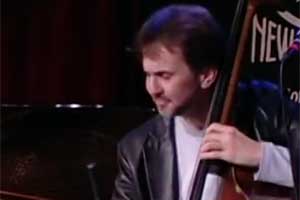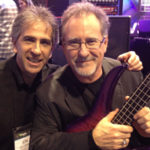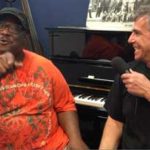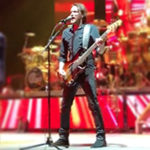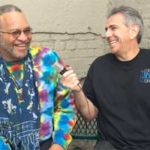Jazz ace gives first-hand accounts of the tours with Cleo Laine, Stéphane Grapelli and George Shearing, as well as being Erroll Garner’s last bass player!
Exclusive interview with FBPO’s Jon Liebman
September 3, 2012
Brian Torff is a renowned bassist, composer, author and educator. His professional career began in 1974 when bassist Milt Hinton offered him the opportunity to tour with Cleo Laine. Brian has since performed and/or recorded with Mary Lou Williams, Marian McPartland, Erroll Garner, Stéphane Grapelli, Mel Tormé and many others, as well as in the big bands of Oliver Nelson and the Thad Jones-Mel Louis Orchestra. He is also well known for his tenure with pianist George Shearing.
Brian has served as co-chairperson for the Music Advisory Board for the National Endowment for the Arts and was named Artist of the Year by the Fairfield Arts Council. He is also the author of In Love With Voices: A Jazz Memoir, published by iUniverse.
Torff currently serves as Professor of Music and Music Program Director at Fairfield University, as well as a featured soloist and musical director for the Django Reinhardt New York Festival. Brian continues to perform at jazz festivals throughout the United States.
FBPO: How would you describe your musical upbringing?
BT: My father loved music and played records all the time. My mother loved theatre and, though I grew up outside of Chicago, we went to New York City many times. They both gave me a love for the arts.
FBPO: How did you become a bass player?
BT: When I was in sixth grade, there was a demonstration of various musical instruments at school. I went over to an old beat up double bass, plucked the E string and that was it! Love at first sound.
FBPO: Were you first exposed to the bass in the traditional manner — classical, bow, Simandl, etc.?
BT: I studied German bow out of the Simandl bass book and supplemented that with the Ray Brown and Ron Carter books on jazz bass playing.
FBPO: Have you ever played much electric bass?
BT: Yes, definitely! I played in rock band from age 15 and I studied electric bass with a teacher in Chicago. I recall using the Carol Kaye bass books to help with my reading, which was pretty bad at the time. I play electric bass regularly and love it like I do the acoustic.
FBPO: How did your career get started? Can you identify a defining moment when things began to take off?
BT: The great master bassist Milt Hinton had me over to his house for dinner and helped facilitate a tour for me with Cleo Laine and John Dankworth. I was 20 years old and suddenly performing at Carnegie Hall. I was scared out of my wits, but that put me on my way.
FBPO: I had the honor and privilege of touring with Cleo Laine back in the ’80s. Tell me about your experience with her.
BT: You must have enjoyed that experience! Cleo is a fantastic singer and I loved the music. It was a thrill to begin my career working with such stellar professionals as her and John. I had never been on the road before, so every day was a thrill.
FBPO: How about Stéphane Grappelli? That must have been a very special, too.
BT: He was a genius with an amazing spirit. His playing was effortless and his enthusiasm was contagious. It was inspiring and quite incredible to be standing next to a mast virtuoso every night. Playing with Stéphane was an honor and a real highlight of my career. I wrote about this in my memoir, In Love With Voices.
FBPO: I first became aware of your playing when you were with George Shearing. In fact, I’ve still got some great vinyl recordings of your duo with him. You’ve got to have at least one really good George Shearing story you can share!
BT: Vinyl, now those were the days! George was encouraging and it was an incredible learning experience to play duo every night with a master musician. I would say our one time playing with Benny Goodman would be one of the top stories, but it takes a while to tell. That is also in my memoir and it was a real scene! George brought a lot of music out of me and I will be forever grateful.
FBPO: Tell me about the music program at Fairfield University. What is your role there?
BT: I am a professor of music and music program director. I teach history of jazz, music of black Americans, world music, history of rock, jazz harmony and I lead the jazz ensemble. It is a small liberal arts school, but we do a lot with what we have. I love teaching.
FBPO: What else is keeping you busy these days?
BT: I went back to my beginning phase and formed a rock/blues band, Phantom Pluckers. This project is growing. I write the material and do most of the lead vocals. My Chicago music roots are important to me and I have been enjoying the process of rediscovering them. I hope people will find this as interesting as I do!
FBPO: How about the future? What else would you like to do that you haven’t accomplished already?
BT: In addition to composing, performing and teaching, I like to write. I am at the early stages of a writing project about the evolution of American music. I feel the need to write a book that might have some small impact on our cultural awareness. We’ll see if I have what it takes!
FBPO: What would you be if you weren’t a bass player?
BT: Well, I wanted to be Ernie Banks but that didn’t happen! I guess I would be a writer. Words are very important to me.
FBPO: I heard a bit of Erroll Garner on the radio this morning, which made me think of you. He truly was a legend and I understand you worked with the last band he ever had. Can you tell me a little bit about the Erroll Garner gig, as well as Erroll Garner the man?
BT: The best way I can sum that up for you is with a couple excerpts from the section about Erroll Garner in my book:
Playing with him was a unique challenge for me because it was like dancing in two different tempos at the same time. His steady left hand played solid quarter notes right on the beat, while his improvising right played so far behind that I thought at times I would tip over. I loved the music, but initially felt a bit rhythmically seasick, and wondered if I would have to be on Dramamine for a while. Garner was an original who only played like himself, defied categories of any kind and sounded as if he learned the piano on a desert island, quite far from the influence of the mainland.
I thought of Erroll as a beautiful man of two layers. On the outside was the amazing pianist with a totally original style, who unconventionally approached music like a child sitting down at the keyboard, never listening to the teacher, doing things his own way through discovery. He was, as Ellington used to say in his highest form of praise, “Beyond category.” He was a popular jazz musician who was embraced by the public and was often underestimated by the hipsters of the modern era. In my opinion, he did the very thing a jazz musician is supposed to do; he achieved an original and authentic voice that resonated within those who heard him. You can’t ask for much more than that.
From In Love With Voices: A Jazz Memoir, by Brian Torff, iUniverse Press, 2009. Reprinted with permission.
